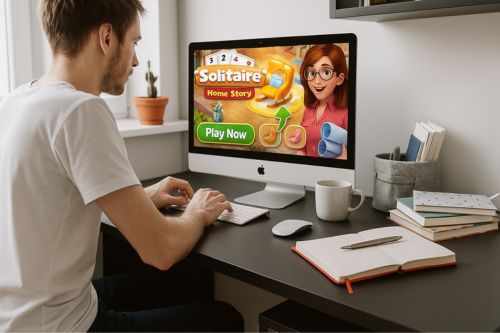What Games Are Good for Memory and Why They Work

What games are good for memory? From puzzles to card classics, discover online games to help memory, sharpen focus, and keep your mind razor-sharp.
Memory is one of the mind's most vital tools. It allows us to remember where we parked, recognize faces, hold onto joyful moments, and even anticipate future tasks. But let’s be honest: it can be overwhelming. With so many things to juggle in a day—deadlines, appointments, groceries, passwords—our minds need more than coffee to stay sharp.
Luckily, there are many strategies to keep your memory active and healthy. One of the most enjoyable things to do is playing games. From online games to help memory to traditional puzzles, play can do wonders for our recall, cognition, and mental flexibility. So if you're wondering what games help with memory, the answer may lie in the ones you love already.
Best Games to Help with Memory

1. Solitaire Home Story
This game mixes classic solitaire with storytelling. Track card sequences while following Alice’s home renovation journey. The gameplay strengthens memory and attention while keeping things emotionally engaging.
2. Lumosity
Designed by neuroscientists, Lumosity offers daily brain-training exercises focused on memory, attention, and flexibility. It’s one of the most well-known games to improve memory.
3. Elevate
This award-winning app focuses on language and math but includes strong memory components. The personalised challenges adapt to your skill level, providing a fun mental workout.
4. Sudoku
A numbers puzzle that relies heavily on memory and logic. It helps improve pattern recognition and strategic thinking, especially when played regularly.
5. Peak
Peak is a sleek brain-training app with over 40 games aimed at improving mental agility, including memory. It also tracks your progress over time.
6. Crossword Puzzles
These classic word games improve verbal memory and recall. Solving clues, recalling synonyms, and working through definitions is excellent for brain health.
7. Matching Pairs
Whether it’s digital or physical, memory match games train your short-term memory and attention to detail. They're deceptively simple but highly effective.
8. Simon Says (Digital or Physical)
This colour-and-sound pattern game sharpens visual and auditory memory. It challenges you to recall sequences under time pressure.
9. Brainwell
Brainwell offers fun, research-based games that are specifically designed to target memory, logic, and concentration.
10. Jigsaw Puzzles
These promote spatial memory and concentration. Remembering pieces and how they fit together helps train visual recognition and problem-solving skills.
Why Games Are Good for Memory

Games aren’t just for fun, they're an incredible workout for your brain. Playing a game requires attention, strategic thinking, pattern recognition, and memory recall. In fact, studies show that engaging in certain types of games can increase neural plasticity, the brain's ability to form new connections and strengthen old ones.
Card games, in particular, are excellent memory trainers. When playing a game like Solitaire, you constantly track which cards have been played, which are still hidden, and what options remain. This builds short-term memory and enhances decision-making.
Furthermore, games require multitasking. You’re remembering rules, thinking several moves ahead, and reacting to outcomes; all while enjoying and relaxing yourself. It’s a mental challenge wrapped in entertainment, making memory-building feel less like work and more like play.
How Card Games Boost Cognitive Recall

Card games deserve their own spotlight when it comes to games that are good for your memory. From Bridge to Solitaire, the challenge of remembering card placements and sequences encourages deep mental engagement. According to a 2017 study published in the Journal of Gerontology, older adults who regularly played card games scored higher on memory and cognitive tests than those who didn’t.
These games encourage you to stay present and focused. You're not just playing for fun; you're planning, predicting, and tracking outcomes. Over time, these small actions accumulate into stronger cognitive skills.
Card games are also highly accessible. Whether you're on your computer, phone, tablet, or using a physical deck, you can practice anywhere. Solitaire Home Story, for example, combines classic card strategy with narrative immersion; giving your brain both structure and story. When looking for games to help improve memory, card games are a timeless and effective choice.
